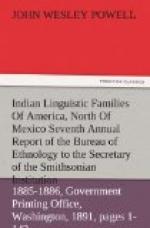The introduction consists of a number of chapters, as follows: First, Geographical notices and Indian means of subsistence; second, Ancient semi-civilization of New Mexico, Rio Gila and its vicinity; third, Philology; fourth, Addenda and miscellaneous. In these are brought together much valuable information, and many important deductions are made which illustrate Mr. Gallatin’s great acumen. The classification given is an amplification of that adopted in 1836, and contains changes and additions. The latter mainly result from a consideration of the material supplied by Mr. Hale, or are simply taken from his work.
The groups additional to those contained in the Archaeologia Americana are:
1. Arrapahoes.
2. Jakon.
3. Kalapuya.
4. Kitunaha.
5. Lutuami.
6. Palainih.
7. Sahaptin.
8. Selish (Tsihaili-Selish).
9. Saste.
10. Waiilatpu.
1848, Latham (Robert Gordon).
On the languages of the Oregon Territory.
In Journal of the
Ethnological Society of London,
Edinburgh, 1848, vol. 1.
This paper was read before the Ethnological Society on the 11th of December. The languages noticed are those that lie between “Russian America and New California,” of which the author aims to give an exhaustive list. He discusses the value of the groups to which these languages have been assigned, viz, Athabascan and Nootka-Columbian, and finds that they have been given too high value, and that they are only equivalent to the primary subdivisions of stocks, like the Gothic, Celtic, and Classical, rather than to the stocks themselves. He further finds that the Athabascan, the Kolooch, the Nootka-Columbian, and the Cadiak groups are subordinate members of one large and important class—the Eskimo.
No new linguistic groups are presented.
1848. Latham (Robert Gordon).
On the ethnography of Russian America.
In Journal of the Ethnological
Society of London, Edinburgh,
1848, vol. 1.
This essay was read before the Ethnological Society February 19, 1845. Brief notices are given of the more important tribes, and the languages are classed in two groups, the Eskimaux and the Kolooch. Each of these groups is found to have affinities—
(1) With the Athabascan tongues, and perhaps equal affinities.
(2) Each has affinities with the Oregon languages, and each perhaps equally.
(3) Each has definite affinities with the languages of New California, and each perhaps equal ones.
(4) Each has miscellaneous affinities with all the other tongues of North and South America.
1848. Berghaus (Heinrich).
Physikalischer Atlas oder Sammlung von
Karten, auf denen die
hauptsaechlichsten erscheinungen
der anorganischen und organischen
Natur nach ihrer geographischen
Verbreitung und Vertheilung bildlich
dargestellt sind. Zweiter
Band, Gotha, 1848.




